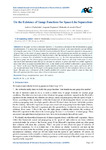
Please use this identifier to cite or link to this item:
http://ricaxcan.uaz.edu.mx/jspui/handle/20.500.11845/532Full metadata record
| DC Field | Value | Language |
|---|---|---|
| dc.contributor.other | 0000-0001-5324-1834 | es_ES |
| dc.contributor.other | 0000-0002-1478-7946 | es_ES |
| dc.contributor.other | https://orcid.org/0000-0001-5324-1834 | es_ES |
| dc.contributor.other | https://orcid.org/0000-0002-1478-7946 | - |
| dc.coverage.spatial | Global | es_ES |
| dc.creator | Chubykalo, Andrew | - |
| dc.creator | Espinoza, Augusto | - |
| dc.creator | Alvarado Flores, Rolando | - |
| dc.date.accessioned | 2018-06-12T16:28:42Z | - |
| dc.date.available | 2018-06-12T16:28:42Z | - |
| dc.date.issued | 2017 | - |
| dc.identifier | info:eu-repo/semantics/publishedVersion | es_ES |
| dc.identifier.issn | 2349-7882 | es_ES |
| dc.identifier.uri | http://hdl.handle.net/20.500.11845/532 | - |
| dc.identifier.uri | https://doi.org/10.48779/140e-ej52 | es_ES |
| dc.description.abstract | In this paper we have a threefold objective. 1. To propose a method for the determination of gauge transformations. 2. to prove that some gauge transformations are local, in the sense that they are not defined all along the space-time. 3. To show that the Cauchy problem for Maxwell equations depends on the geometry of space-time, so the choice of gauge cannot be convential. After developing our method we compare it with Jackson´s well known procedure of [1]. Our first result is that the methods are not coextensive, but they have, however, a common class of solutions in some important cases, e.g. the class of gauge functions transforming the Lorenz gauge into the velocity gauge which is treated in detail. However, our scope in the paper is wider and much more theoretical than that of [1], because we advance to prove that there are certain regions in space-time where no gauge transformation exists, so the results of any method to determine a gauge function are “local” in the sense that they produce results valid for a bounded space-time región, and not for all. So our second and main result in the paper is that gauge transformations in electromagnetic theory are always local. We give also a discussion of the Cauchy problem for classical space-times in order to show that Maxwell equations for these space-times allow instantaneous solutions. | es_ES |
| dc.language.iso | eng | es_ES |
| dc.publisher | Academicians Research Center | es_ES |
| dc.relation | https://www.arcjournals.org/international-journal-of-advanced-research-in-physical-science | es_ES |
| dc.relation.uri | generalPublic | es_ES |
| dc.rights | Atribución-NoComercial-CompartirIgual 3.0 Estados Unidos de América | * |
| dc.rights.uri | http://creativecommons.org/licenses/by-nc-sa/3.0/us/ | * |
| dc.source | International Journal of Advanced Research in Physical Science (IJARPS), Vol. 4, Núm. 6, 2017. | es_ES |
| dc.subject.classification | CIENCIAS FISICO MATEMATICAS Y CIENCIAS DE LA TIERRA [1] | es_ES |
| dc.subject.other | Gauge transformations | es_ES |
| dc.subject.other | space-like surfaces | es_ES |
| dc.title | On the Existence of Gauge Functions for Space-Like Separations | es_ES |
| dc.type | info:eu-repo/semantics/article | es_ES |
| Appears in Collections: | *Documentos Académicos*-- UA Física | |
Files in This Item:
| File | Description | Size | Format | |
|---|---|---|---|---|
| 2017On the Existence.pdf | 716,44 kB | Adobe PDF |  View/Open |
This item is licensed under a Creative Commons License
